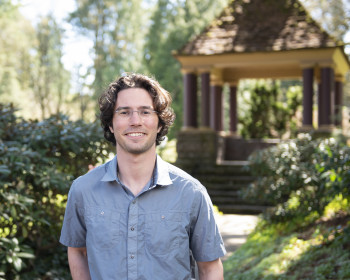Students and alumni blog about service work in Africa
Open gallery
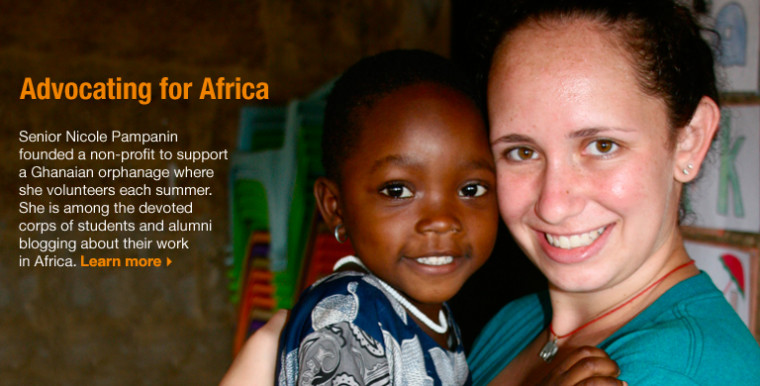
Nicole Pampanin ’11 found her calling in Ghana. The sociology/anthropology major has spent the past three summers in Gbi-Wegbe, Ghana, volunteering at an orphanage, learning the local language, and building ties within the community.
Her experiences in Ghana, and her devotion to the people she has met there, inspired her to found The Ghana Project, a nonprofit organization aimed at raising money for the orphanage through the sale of Ghanaian fabric crafts. Pampanin also maintains a blog on The Ghana Project website, where she writes about her experiences in Africa and reflects on cultural differences and similarities.
“I learned so much more about the Ghanaian lifestyle,” she wrote after returning last summer. “I realized that I have the potential to continue to make great things happen for the community in Ghana that I care about so much and other communities that I hope to be able to help in the future. And most of all, I learned once again to appreciate life and live every moment to the fullest.”
Pampanin plans to move to Ghana after graduation. She will join a corps of dedicated alumni who are taking their passion to make a difference to the farthest reaches of the world and writing about their successes and hardships along the way.
Learn more about some of these alumni and find links to their blogs below.
Miel Hendrickson BA ’99: Relieving suffering in West Africa
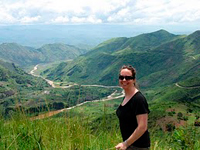
Hendrickson is regional coordinator for International Medical Corps in West Africa, where she works on international relief and development projects. Recently, Hendrickson spoke to international media about her team’s treatment of more than 200 women who were raped in rebel attacks in Eastern Congo. Listen to her interview with NPR.
On her blog, Vicarious Nomad, Hendrickson reflected on recent events in the Democratic Republic of the Congo and her goal of raising awareness of sexual violence around the world.
“Rape anywhere is not an easy subject to talk about, but certainly not on the scale we see here. I remember learning about the issue back in early 2004 from a Congolese friend in D.C. I was appalled that the world wasn’t up in arms about such horrific rapes occurring, and that I hadn’t heard of the details earlier. Now I’m glad to have the opportunity to learn firsthand and share with friends, family, and the rest of the world.”
Isaac Holeman BA ’09 and Dieterich Lawson ’12: Connecting health care workers
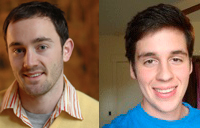
Holeman is a co-founder of FrontlineSMS:Medic, an organization seeking the practical application of mobile technology in global healthcare delivery. Lawson currently works as lead developer for the organization’s tools, which include a medical records system that can be used anywhere there is a mobile signal.
Holeman described the group’s work in a recent post on the FrontlineSMS:Medic blog:
“Dieterich and I recently attended the annual OpenMRS meeting, and it was great. Dieterich has been working very hard on a messaging module that will enable health workers to send SMS and other types of messages via OpenMRS, and his demo was very well received. I had a great time brainstorming with friends and mentors from all over the world…One of the key elements of this meeting was the sense of community, and the clear agreement that the meeting itself wasn’t just about understanding our software application, it was about building relationships and a collegial atmosphere that will keep this good work moving forward despite many inevitable challenges.”
Alex Harsha BA ’09: Seeking culturally appropriate solutions
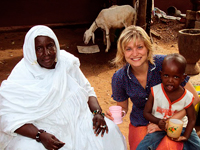
Harsha, who studied international affairs at Lewis & Clark, began working in Mali after graduation. She works with the Mali Health Organizing Project on a mobile medical records system developed by FrontlineSMS:Medic. On her blog, N be taa Mali la…, she writes about her experiences with the NGO and about what she is learning during her time in Mali.
“Development folk often talk about the ‘last mile.’ Both a useful metaphor and a geographical reality, the last mile is…that final leg separating a population from needed services. Mobile phone-wielding community health workers are a last mile solution in multiple senses: using the only type of telecommunications infrastructure accessible, these outreach workers bring primary care to populations who are not otherwise connected to health services. Yet, in development work, the last mile is not only a physical barrier, but a temporal one as well. How do you make a project sustainable in the world’s most impoverished, inaccessible, and under-educated areas? Keep it simple…Whatever we provide, it is precisely those under-resourced communities who must bear the cost of sustaining a program, which means the system must be low-tech and easily manageable by people who have more than enough work to do already!”
*If you are a Lewis & Clark student or alum blogging from abroad, and you would like your site considered for inclusion, please contact public@lclark.edu
More Newsroom Stories
Public Relations is located in McAfee on the Undergraduate Campus.
MSC: 19
email public@lclark.edu
voice 503-768-7970
Public Relations
Lewis & Clark
615 S. Palatine Hill Road MSC 19
Portland OR 97219
